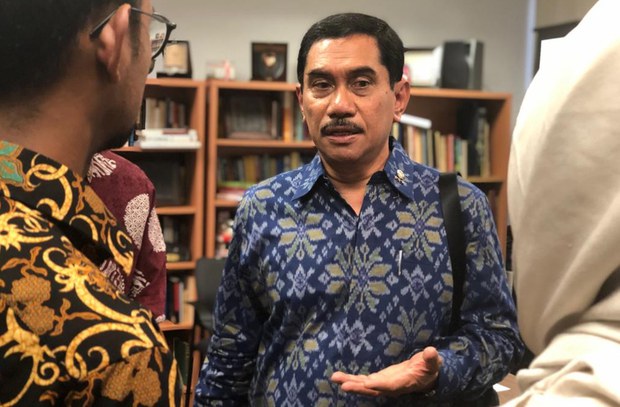Counter-Terror Chief: Indonesia Preparing Strategy to Defeat Violent Extremism
2019.07.23
Washington
 Suhardi Alius, chief of Indonesia’s National Counter-Terrorism Agency (BNPT), talks to attendees of an open forum in Washington, D.C., July 23, 2019.
Suhardi Alius, chief of Indonesia’s National Counter-Terrorism Agency (BNPT), talks to attendees of an open forum in Washington, D.C., July 23, 2019.
Indonesia is setting up a strategy to counter violent extremism, the nation’s anti-terror chief said Tuesday, underscoring that the Islamic State militant group “remains an eminent threat” in the Southeast Asian country that had suffered devastating terror attacks in recent years.
Despite its defeat in the Middle East, the Islamic State (IS) has changed its terror tactics by extending its sphere of influence in Southeast Asia’s local terrorist networks, according to Suhardi Alius, head of Indonesia’s National Counter-Terrorism Agency (BNPT).
“For Indonesia, the influence of ISIS remains an eminent threat, particularly those related to Foreign Terrorist Fighters returnees and re-locators, including the so-called ‘frustrated travelers,’” Suhardi said in a speech, using the other acronym for IS.
Suhardi issued his remarks at the United States-Indonesia Society in Washington just hours after police in Jakarta identified a married Indonesian couple who they believe perpetrated a suicide bombing that killed 23 people at a church in the southern Philippines in January. The couple once tried to reach IS territory in Syria, authorities said.
“BNPT is embarking on setting up a national action plan to counter violent extremism,” Suhardi said, emphasizing that the move would signify Indonesia’s adherence to a United Nations resolution requesting countries to establish blueprints to repel terrorism.
He said the plan, including what he called three pillars – prevention, law enforcement with strengthened legislative framework, and international cooperation – would prevent conditions “conducive to terrorism” and radicalization.
“The basis of work for the national action plan is a whole of government and whole of society approach,” he said, as he emphasized that a draft of the document would be prepared after consultations with several groups before it would lead to a presidential decree.
In March this year, U.S.-backed forces declared they had captured the last IS bastion in eastern Syria after pummeling the extremist group, which once controlled a swath of land that spilled across the boundaries of Iraq and Syria.
The victory of Syrian Democratic Forces ended the suffering inflicted by the militants’ horrific rampage in the region, but also ushered in other complex issues, including the extradition – or legal proceedings – for captured foreign fighters, as well as their wives and children.
Indonesian security officials who visited Syria and Iraq in June said about 100 Indonesian men, women and children were languishing in several camps along the border between the two Middle Eastern countries.
Suhardi, who arrived in Washington on Tuesday, told BenarNews that his three-day visit would include meetings with Pentagon and National Security Council officials.
“They want to know about our 'soft approach' in countering terrorism,” he said, referring to U.S. officials.
During his speech, Suhardi said his agency had developed "soft" measures, including engaging members of the local community and former militants, in efforts to defeat radicalism. Such measures include providing support for two Islamic boarding schools established by former terrorists in North Sumatra and in East Java provinces, he said.
“If we counter radical ideology using violent means, it might seem that we've destroyed it, but actually it didn't die and it could rekindle itself as new terrorist cells,” he said.
Suhardi also said that Jakarta would create a task force to decide on the fate of the Indonesians with militant links in the Middle East.
The task force will be led by BNPT, foreign affairs representatives and officials from the National Intelligence Agency (BIN), the Ministry of Social Affairs and military officers, among others, he said.
Under Indonesian law, Suhardi said, citizens who fight for a foreign country could be stripped of their citizenship, but the question of whether those who joined IS in the Middle East should be allowed to return to Indonesia is “debatable.”
Citing intelligence data from his government, Indonesian Defense Minister Ryamizard Ryacudu told a security forum in Singapore last year that about 400 out of 31,500 foreign fighters who had joined IS in Syria were from Indonesia.
Evolution of terrorism
During the last three years, Indonesia has witnessed the evolution of terrorism, from al-Qaeda to IS-inspired bombings, Suhardi said.
“The latest bombing in Surabaya showcased how a family was influenced by a Foreign Terrorist Fighter returnee,” he said, referring to the terror attacks in May last year in which two families carried out suicide bombings at three churches and a police station in Surabaya, Indonesia’s second-largest city and the capital of East Java province.
Authorities said 29 people were killed, including 13 of the suspects who used their children as young as 9 in carrying out the bomb attacks.
Suhardi told BenarNews that the IS-linked Jamaah Ansharut Daulah (JAD), which had been outlawed in July 2018, poses the biggest security threat in Indonesia.
“But we have to keep our vigilance against all [terror] cells with terrorism experience, such as those that can resurface anytime,” he said.
JAD militants carried out attacks during the past three years, including one that killed four people in January 2016 in Jakarta, the first terror strike claimed by IS in Southeast Asia.
JAD became the second organization to be outlawed by an Indonesian court since 2008, when authorities banned Jamaah Islamiyah (JI), the group blamed for the 2002 Bali bombings that killed 202 people.







